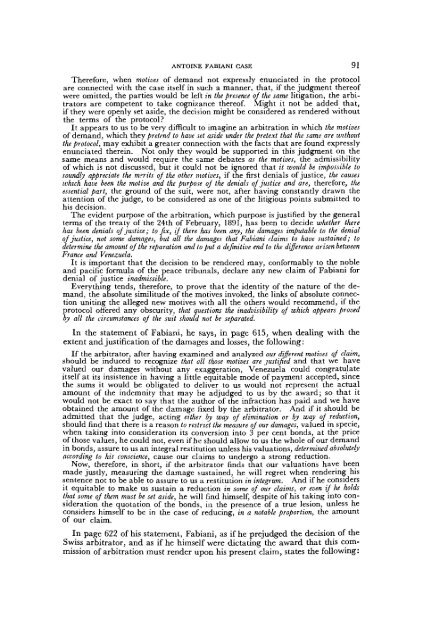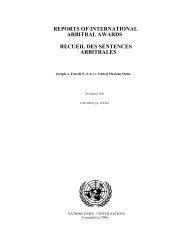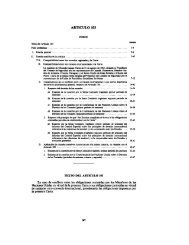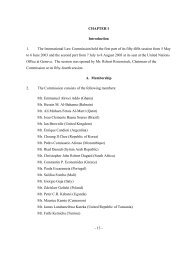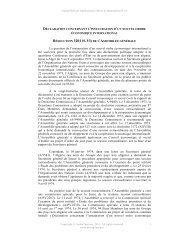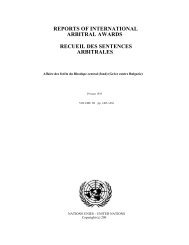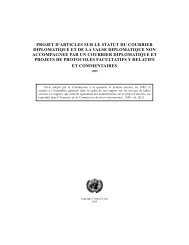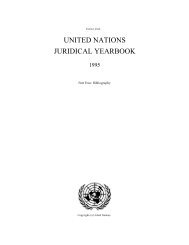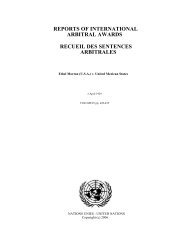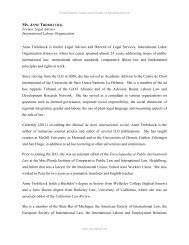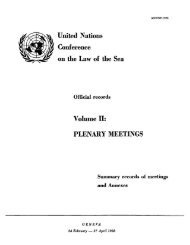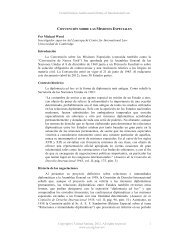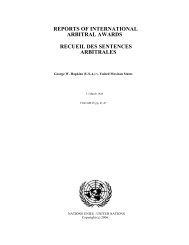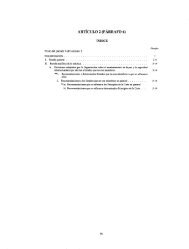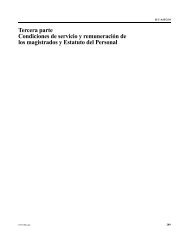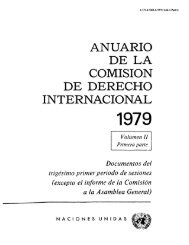Antoine Fabiani Case - United Nations Treaty Collection
Antoine Fabiani Case - United Nations Treaty Collection
Antoine Fabiani Case - United Nations Treaty Collection
You also want an ePaper? Increase the reach of your titles
YUMPU automatically turns print PDFs into web optimized ePapers that Google loves.
ANTOINE FABIANI CASE 91<br />
Therefore, when motives of demand not expressly enunciated in the protocol<br />
are connected with the case itself in such a manner, that, if the judgment thereof<br />
were omitted, the parties would be left in the presence oj the same litigation, the arbitrators<br />
are competent to take cognizance thereof. Might it not be added that,<br />
if they were openly set aside, the decision might be considered as rendered without<br />
the terms of the protocol?<br />
It appears to us to be very difficult to imagine an arbitration in which the motives<br />
of demand, which they pretend to have set aside under the pretext that the same are without<br />
the protocol, may exhibit a greater connection with the facts that are found expressly<br />
enunciated therein. Not only they would be supported in this judgment on the<br />
same means and would require the same debates as the motives, the admissibility<br />
of which is not discussed, but it could not be ignored that it would be impossible to<br />
soundly appreciate the m?rits of the other motives, if the first denials of justice, the causes<br />
which have been the motive and the purpose oj the denials oj justice and are, therefore, the<br />
essential part, the ground of the suit, were not, after having constantly drawn the<br />
attention of the judge, to be considered as one of the litigious points submitted to<br />
his decision.<br />
The evident purpose of the arbitration, which purpose is justified by the general<br />
terms of the treaty of the 24th of February, 1891, has been to decide whether there<br />
has been denials oj justice; to jix, ijthere has been any, the damages imputable to the denial<br />
oj justice, not some damages, but all the damages that <strong>Fabiani</strong> claims to have sustained; to<br />
determine the amount oj the reparation and to put a definitive end to the difference arisen between<br />
France and Venezuela.<br />
It is important that the decision to be rendered may, conformably to the noble<br />
and pacific formula of the peace tribunals, declare any new claim of <strong>Fabiani</strong> for<br />
denial of justice inadmissible.<br />
Everything tends, therefore, to prove that the identity of the nature of the demand,<br />
the absolute similitude of the motives invoked, the links of absolute connection<br />
uniting the alleged new motives with all the others would recommend, if the<br />
protocol ottered any obscurity, that questions the inadvisibility oj which appears proved<br />
by all the circumstances oj the suit should not be separated.<br />
In the statement of <strong>Fabiani</strong>, he says, in page 615, when dealing with the<br />
extent and justification of the damages and losses, the following:<br />
If the arbitrator, after having examined and analyzed our different motives oj claim,<br />
should be induced to recognize that all those motives are justified and that we have<br />
valued our damages without any exaggeration, Venezuela could congratulate<br />
itself at its insistence in having a little equitable mode of payment accepted, since<br />
the sums it would be obligated to deliver to us would not represent the actual<br />
amount of the indemnity that may be adjudged to us by die award; so that it<br />
would not be exact to say that the author of the infraction has paid and we have<br />
obtained the amount of the damage fixed by the arbitrator. And if it should be<br />
admitted that the judge, acting either by way oj elimination or by way oj reduction,<br />
should find that there is a reason to restrict the measure oj our damages, valued in specie,<br />
when taking into consideration its conversion into 3 per cent bonds, at the price<br />
of those values, he could not, even if he should allow to us the whole of our demand<br />
in bonds, assure to us an integral restitution unless his valuations, determined absolutely<br />
according to his conscience, cause our claims to undergo a strong reduction.<br />
Now, therefore, in short, if die arbitrator finds that our valuations have been<br />
made justly, measuring die damage sustained, he will regret when rendering his<br />
sentence not to be able to assure to us a restitution in integrum. And if he considers<br />
it equitable to make us sustain a reduction in some oj our claims, or even if he holds<br />
that some oj them must be set aside, he will find himself, despite of his taking into consideration<br />
the quotation of the bonds, in the presence of a true lesion, unless he<br />
considers himself to be in the case of reducing, in a notable proportion, the amount<br />
of our claim.<br />
In page 622 of his statement, <strong>Fabiani</strong>, as if he prejudged the decision of the<br />
Swiss arbitrator, and as if he himself were dictating the award that this commission<br />
of arbitration must render upon his present claim, states the following:


